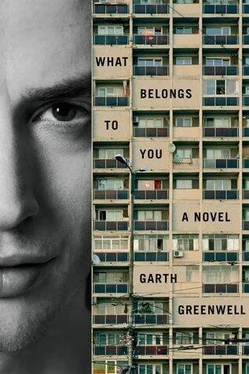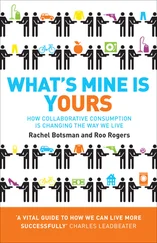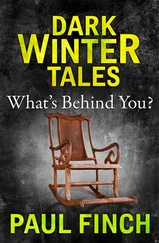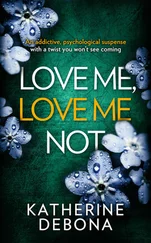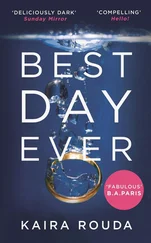Speaking of these things seemed to make Mitko uneasy, and he changed the subject by saying that, though I had found him at NDK, where he had spent much of the day, he had nevertheless been saving himself for our evening together. He looked at me sidelong as he said this ( Razbirash li? ) and I felt myself flush with excitement. Mitko seemed eager, too, full of an energy that propelled him forward, and as we walked down Vasil Levski toward Graf Ignatief, crossing innumerable side streets and alleyways, more than once I had to grab his arm and, saying to him again Chakai chakai chakai , pull him back from oncoming traffic. When we turned onto Graf Ignatief, he stopped in front of the many electronics stores and pawnshops, evaluating the products laid out in their windows. I was surprised by how much he knew about these phones and tablets, his monologues punctuated by English words for the various devices’ specs, pixels and memory cards and battery life, information he must have gleaned from the advertisements and brochures he picked up wherever they were offered. I tried to hurry him along, impatient to get home and uneasy at what seemed more and more like hints, especially when Mitko told me that his current phone, a model he clearly hoped to upgrade, was a gift from one of his friends. This word, podaruk , gift, would recur again and again in Mitko’s conversation that evening, applied, it seemed, to nearly everything he owned.
Finally we came to the end of Graf Ignatief, and as we approached the small river that circles central Sofia, really little more than a drainage ditch, Mitko said Chakai malko , wait a little, and stepped off the sidewalk toward the sparse vegetation at the river’s bank. I walked on a few steps, then turned to look back at him, though I could barely make him out (it was dark now, the autumn night had fallen as we walked) as he stood at the bank to relieve himself into the water. He seemed entirely unconcerned by the passersby, the heavy traffic on one of Sofia’s busiest streets; and when he caught me watching him, he stuck his tongue out and wagged his cock in his hand, sending his piss in high arcs over the water, where it glimmered in the lights of oncoming cars. It was a gesture so innocent, so full of childlike irreverence, that I found myself smiling stupidly back at him, filled with a sense of goodwill that buoyed me toward the metro station and our short commute. There was only one metro line in Sofia (though more were planned and great trenches had been gouged in neighborhoods throughout the city), and during peak hours it seemed as though the entire population were shuttling underground, alternately swallowed and disgorged through the closing doors. There were no seats on the Mladost train, and Mitko and I were separated from each other, standing finally some distance apart in the press of bodies. Mitko studied the maps above each set of doors, watching the stations light up as we passed them, but every now and then he glanced at me, as if to make sure I was still there or that my attention was still fixed on him, and his look now wasn’t innocent, anything but; it was a look that singled me out, a look full of promise, and under its heat I felt myself gripped yet again by both pleasure and embarrassment, and by an excitement so terrible I had to look away.
When we emerged at the subway’s last stop, Mladost 1, spilling with the other passengers onto Andrei Sakharov Boulevard, I was surprised to see that Mitko knew the area well. Once he had oriented himself, he pointed toward one of the blokove , the dire Soviet apartment complexes that line both sides of the boulevard, and said that it was the home of one of his priyateli . As was always the case during our time together, I was frustrated by the fragments that were all I could understand of his stories, both because of my poor Bulgarian and because he kept speaking in a kind of code, so that I seldom understood precisely the nature of the relationships he described or why they ended as they did. Never before had I met anyone who combined such transparency (or the semblance of transparency) with such mystery, so that he seemed at once overexposed and hidden behind impervious defenses. We fell silent as we walked toward my building, both of us perhaps thinking of what awaited us there. On my street, the relative prosperity of which marked it off from its neighbors, Mitko turned into a shop for alcohol and cigarettes, a place I stopped at often; the people who worked there knew me, and I wondered uncomfortably what they would think when they saw us together. Mitko walked in first and placed both of his hands palm down on the glass counter, making the shopkeeper wince, and then leaned over to peer at the more expensive bottles displayed on the back wall. He examined several of these, asking the man repeatedly and to his increasing exasperation to pass them over the counter so he could read their labels. He chose the most expensive bottle of gin, as well as a cheap orange soda to accompany it, and then took the bag from my hand to carry it up the three flights to my apartment. I lived in a nice two-bedroom provided by my school, a fact I tried to communicate to Mitko when it became clear he thought I owned it. I don’t have that kind of money, I told him, wanting to establish the modest reality of my means, but he greeted the claim with skepticism, even disbelief. But you’re American, he said, all Americans have money. I protested, telling him I was a schoolteacher, that I made hardly any money at all; but of course he would think this, having seen my laptop computer, my cell phone, my iPod, signs of comfort if not particularly of wealth in America that here are items of some luxury.
Mitko placed the bag with his bottles on the kitchen counter and opened the cabinets above it, looking for a glass. I stepped up behind him and slid my hands beneath his shirt, pressing my mouth to his neck, but he shrugged me off, saying we had plenty of time for that, he wanted to have a drink first. He took his large tumbler of gin and soda and opened the door to the small balcony that all apartments here have. He stood there for a while as he drank, looking out over the street where I live, which seems never to have been given a name. None of the smaller streets in Mladost have names, though in the center the nation’s whole history, its victories and defeats, the many indignities and small prides of a small country, play out in the names of its avenues and squares. Here in Mladost, it’s the blokove , the huge towers, that anchor one in space, each with its own number individually marked on city maps. As he looked over the street, I asked Mitko what it was he did for a living, by which I meant what it was he had done, before he turned for whatever reason to his priyateli . He was smoking a cigarette, that was why he was on the balcony, though as the night wore on this consideration would lapse, and the next morning I would wipe from the floor small piles of gray ash. Largely through gestures, he conveyed that he worked in construction, mimicking with his wounded hands the motions of his trade, going so far as to walk a few steps as he would on a high beam, balancing against the wind. It took me a moment to realize that these movements, which were oddly familiar, were the same as those with which my father, in my childhood, often made us laugh as he told stories about the single summer he spent working construction in Chicago, fresh from his farm in Kentucky, earning his tuition for law school and thus, among other things, purchasing my life.
Mitko told me he was from Varna, a beautiful port city on the Black Sea coast and one of the centers of the astonishing economic boom Bulgaria briefly enjoyed, before, here as in so much of the world, it collapsed suddenly and seemingly without warning. There were some good years, Mitko said, he made good money, and with sudden urgency he dragged me from the balcony toward the table where I had laid my computer. When he opened it, he made a sound of dismay at the state in which I kept it, the screen mottled with dust; Mrusen , he said, dirty, with the same tone of voice he would use in response to the requests I made of him later, a tone of mockery and disapproval but also of indulgence, spotting a fault it was in his power either to exploit or to repair. He rose and stepped to the kitchen counter, opening two cupboards and then a third before I understood what he was looking for and fetched the bottle of cleaner from beneath the sink. He put his drink (the large glass almost empty) on the table beside him and placed the computer in his lap, almost cradling it, and with a dampened tissue he began cleaning the screen, not in a desultory hurried way, as I might when finally I bothered, but taking his time, working at it with a thoroughness I would never think it needed. He turned to the keyboard, almost as dirty as the screen, and then he closed the machine and with his fifth or sixth tissue wiped down the aluminum case. Sega , he said with satisfaction, now, and set the computer back on its perch, pleased to have done me a service. He opened it again and navigated to a Bulgarian website, an adult social networking site that I knew was popular among gay men. He wanted me to see the pictures from his profile, which he enlarged until they filled the screen. This was two years ago, he said as I looked at the young man in the image, who stood on Vitosha Boulevard with a bag from one of the expensive stores there, smiling radiantly at whoever held the camera, showing his unbroken teeth. I was shocked by the difference between their faces, the man in the image and the man beside me; not only was his tooth unbroken, but also his head was unshaved, his hair full and light brown, conventionally cut. There was nothing rough or threatening about him at all; he looked like a nice kid, a kid I might have had in class at the prestigious school where I teach. It was hardly possible they could be the same person, this prosperous teenager and the man beside me, or that so short a time could have made such a difference, and I found myself looking repeatedly at the screen and then at Mitko, wondering which face was the truer face, and how it had been lost or gained.
Читать дальше
